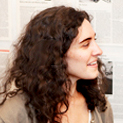 I know well enough that the feelings toward Judaism
and Israel instilled through my upbringing stalk my rational
disinterest. These deep-rooted feelings give rise to such impossible
desires as that the Jewish state should be different--more just, more
compassionate, more understanding of oppression and tragedy--than any
other.
I know well enough that the feelings toward Judaism
and Israel instilled through my upbringing stalk my rational
disinterest. These deep-rooted feelings give rise to such impossible
desires as that the Jewish state should be different--more just, more
compassionate, more understanding of oppression and tragedy--than any
other.Sarah Leonard is an editorial assistant at Dissent and an editor at The New Inquiry. This article first appeared in the Spring 2011 issue of Dissent Magazine.

